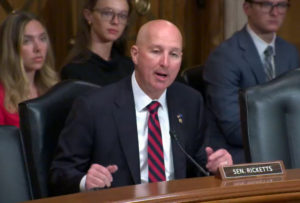The Senate Environment and Public Works Committee held a hearing Wednesday to discuss the Renewable Fuels for Ocean-Going Vessels Act, introduced earlier this year by Sens. Pete Ricketts (R-NE) and Amy Klobuchar (D-MN).
 The legislation would open new markets for U.S. farmers and biodiesel renewable diesel producers by allowing them to preserve Renewable Identification Number credits (RINs) under the Renewable Fuel Standard (RFS) program, when the fuel for use is in ocean-going vessels. Ricketts made the point that renewable fuels help farmers and the rural economy.
The legislation would open new markets for U.S. farmers and biodiesel renewable diesel producers by allowing them to preserve Renewable Identification Number credits (RINs) under the Renewable Fuel Standard (RFS) program, when the fuel for use is in ocean-going vessels. Ricketts made the point that renewable fuels help farmers and the rural economy.
“I love this committee because we get to talk about biofuels,” said Sen. Ricketts at the hearing. “Last time I went and filled up with E10, 89 octane at my local Hy-Vee, I saved 45 cents a gallon versus the regular 89 octane gasoline. And again, this is just a big benefit for not only consumers, but it helps clean up the environment. And it’s great for farmers and ranchers as it creates a premium market for producers offering crucial support in challenging years when staying profitable can be difficult. And this would be one of those years where it’s difficult. With corn at 350, roughly, and soybean at 9 and change, I will tell you right now, our farmers are really in a bad position right now. The feedstock demand for biofuel production helps stabilize prices for corn and soybeans.”
“At its core, the Renewable Fuel Standard supports American agriculture. It directly impacts what farmers receive for what they grow. However, because the RFS excludes ocean-going vessels, the shipping industry is missing out on a proven, cleaner fuel. The Renewable Fuel for Ocean-Going Vessels Act would clear a major roadblock by allowing U.S. biodiesel and renewable diesel producers to meet the needs of ocean-going vessels while preserving RFS credits. It would expand agricultural marketplaces, enhance American energy security, and create parity for maritime fuels with over-the-road and aviation fuel types in the renewable fuel standard.”
Listen to Rickett’s comments here:
Sen. Ricketts comments (10:25)
“This commonsense legislation will remove a regulatory roadblock and enable U.S. biodiesel and renewable diesel producers to keep RFS credits when their fuel is used in U.S. ports to supply cargo, tanker, and passenger ships,” said Kurt Kovarik, Vice President of Federal Affairs for Clean Fuels Alliance America. “When ships arrive in U.S. ports, they’ve often filled up overseas with renewable fuels but can’t do so here. This bill will encourage U.S. producers and farmers to meet that growing demand and maintain America’s energy dominance.”
Under RFS rules, biomass-based diesel producers and blenders must retire RINs when the fuel is used in ocean-going vessels. The legislation would designate such fuel as an “additional renewable fuel” eligible for credit under the Renewable Fuel Standard.
Clean Fuels, American Biogas Council, California Advanced Biofuels Alliance, Coalition for Renewable Natural Gas, Iowa Biodiesel Board, Maritime Innovation Coalition, Minnesota Biodiesel Council, Nebraska Soybean Association, North American Renderers Association, Renewable Fuels Association, and the U.S. Grains & Bioproducts Council sent a letter to Senator Ricketts in support of the legislation to be incorporated for the record during the hearing.
 Since E85 was introduced in California nearly 20 years ago, consumers have saved more than $1 billion at the fuel pump by choosing E85 instead of unleaded gasoline, according to Pearson Fuels, California’s largest E85 provider.
Since E85 was introduced in California nearly 20 years ago, consumers have saved more than $1 billion at the fuel pump by choosing E85 instead of unleaded gasoline, according to Pearson Fuels, California’s largest E85 provider.










